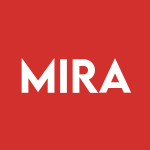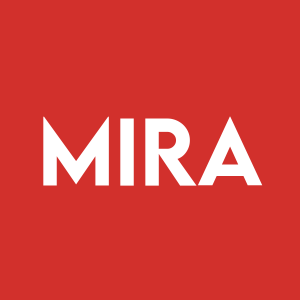Welcome to our dedicated page for Mira Pharma news (Ticker: MIRA), a resource for investors and traders seeking the latest updates and insights on Mira Pharma stock.
Mira Pharmaceuticals Inc (NASDAQ:MIRA) is a preclinical-stage biopharmaceutical company pioneering novel therapies for neurological and neuropsychiatric disorders. This news hub provides investors and industry stakeholders with timely updates on Ketamir-2 and MIRA-55 development progress, regulatory milestones, and strategic initiatives.
Access authoritative reporting on clinical trial developments, FDA communications, and research breakthroughs related to MIRA's innovative drug candidates. Our curated news collection covers essential updates including:
• Preclinical study results for oral ketamine and marijuana analogs
• Regulatory filings including IND application progress
• Intellectual property developments and partnership announcements
• Scientific presentations at major medical conferences
Bookmark this page for consolidated access to verified MIRA Pharma updates, enabling informed tracking of therapeutic advancements in neuropathic pain management and neurocognitive disorder treatments. Check regularly for new developments in this innovative neuroscience pipeline.
MIRA Pharmaceuticals (NASDAQ:MIRA) announced promising new preclinical results for SKNY-1, their oral drug candidate for obesity and nicotine addiction. The drug demonstrated clear reversal of anxiety-related behavior in animal models, while maintaining its previously shown benefits of up to 30% weight loss and craving reduction.
SKNY-1, which is currently under a definitive acquisition agreement, targets the Cannabinoid 1 receptor (CB1) without the serious central nervous system side effects that led to the discontinuation of earlier CB1-targeting drugs. The compound has shown ability to reverse high-calorie food and nicotine cravings while preserving muscle mass in preclinical studies.
MIRA Pharmaceuticals (NASDAQ:MIRA) announced positive preclinical results for Mira-55, its proprietary non-psychotropic marijuana analog, which demonstrated morphine-comparable pain relief in inflammatory pain models without causing inflammation. The drug, engineered to selectively activate CB2 cannabinoid receptors, reduced pain sensitivity by approximately threefold while avoiding euphoria and sedation risks.
Key developments include the DEA's determination that Mira-55 is not classified as a controlled substance, enhancing its clinical and commercial potential. Additionally, MIRA reported progress on its merger with SKNY Pharmaceuticals, whose SKNY-1 therapy showed 30% body weight reduction and nicotine craving reversal in recent studies. The SEC completed its merger proxy review without comments.
[ "Mira-55 demonstrated morphine-equivalent pain relief without addiction or sedation risks", "DEA determined Mira-55 is not a controlled substance, removing development barriers", "SKNY-1 acquisition target showed 30% body weight reduction in studies", "SEC completed merger proxy review with no comments, accelerating SKNY acquisition", "Company advancing two complementary non-opioid pain treatments (Mira-55 and Ketamir-2)" ]MIRA (NASDAQ:MIRA) has announced promising results from animal studies of SKNY-1, an oral therapeutic candidate under definitive agreement for acquisition. The drug demonstrated up to 30% weight loss and reversed high-calorie and nicotine cravings in zebrafish models within six days of treatment.
Key findings include significant metabolic improvements without muscle loss, normalized liver fat and cholesterol levels, and reduced appetite and nicotine-seeking behaviors. The drug achieved these results through selective modulation of CB1 receptors and activation of CB2 receptors, while maintaining a favorable safety profile.
SKNY-1 is being developed as an oral alternative to GLP-1 injectables, addressing limitations of current obesity and smoking cessation treatments. The compound's unique mechanism targets a combined global market opportunity exceeding $200 billion. Following the acquisition of SKNY Pharmaceuticals, Inc., MIRA plans to advance SKNY-1 toward IND-enabling studies.
MIRA Pharmaceuticals (NASDAQ:MIRA) has revealed promising new in vitro preclinical data for SKNY-1, a novel drug candidate pending acquisition through SKNY Pharmaceuticals. The oral therapy targets both weight loss and smoking cessation markets through a dual-receptor strategy.
SKNY-1 functions as a biased CB1 modulator and partial CB2 agonist, designed to avoid the psychiatric side effects that led to the withdrawal of previous cannabinoid-based therapies. The drug selectively blocks β-arrestin signaling while preserving G-protein signaling, potentially enabling weight reduction and decreased cravings without mood disruption.
The compound also features mild MAO-B inhibition for dopamine regulation, positioning it as a differentiated alternative to injectable GLP-1 drugs. The global obesity drug market is projected to exceed $150 billion by 2030, while the U.S. smoking cessation market is expected to grow from $28 billion in 2024 to over $50 billion by decade's end.
MIRA Pharmaceuticals (NASDAQ:MIRA) has announced positive in vitro release testing (IVRT) results for its topical Ketamir-2 formulation, targeting the $11.5B U.S. topical pain relief market. The 5% ointment formulation demonstrated consistent and dose-proportional release in Franz diffusion cell model testing.
The company is advancing preclinical studies to evaluate the topical formulation for inflammatory and neuropathic pain conditions. The development aims to address chronic pain affecting 51.6 million U.S. adults, including osteoarthritis (32.5 million adults) and diabetic peripheral neuropathy (28% of diabetic adults).
MIRA is exploring FDA Fast Track designation possibilities and is simultaneously conducting a Phase 1 clinical trial of oral Ketamir-2 in healthy volunteers, with plans for a Phase 2a study in diabetic neuropathy.
MIRA Pharmaceuticals (NASDAQ:MIRA) has announced positive results for its oral ketamine analog Ketamir-2 in a diabetic neuropathy animal model. The study demonstrated significant reduction in neuropathic pain symptoms, with some subjects achieving complete reversal to pre-diabetic baseline sensitivity.
The company is currently conducting a Phase I clinical trial at Hadassah Medical Center, with completion expected in Q4 2025. MIRA plans to initiate a Phase IIa trial in diabetic neuropathy patients by year-end, with first human efficacy data expected in H1 2026.
Ketamir-2 has shown superior performance compared to FDA-approved medications like pregabalin and gabapentin in preclinical studies. Unlike traditional ketamine, it doesn't cause dissociative effects and offers better blood-brain barrier penetration. The company is also developing a topical slow-release formulation and exploring applications for PTSD treatment.


